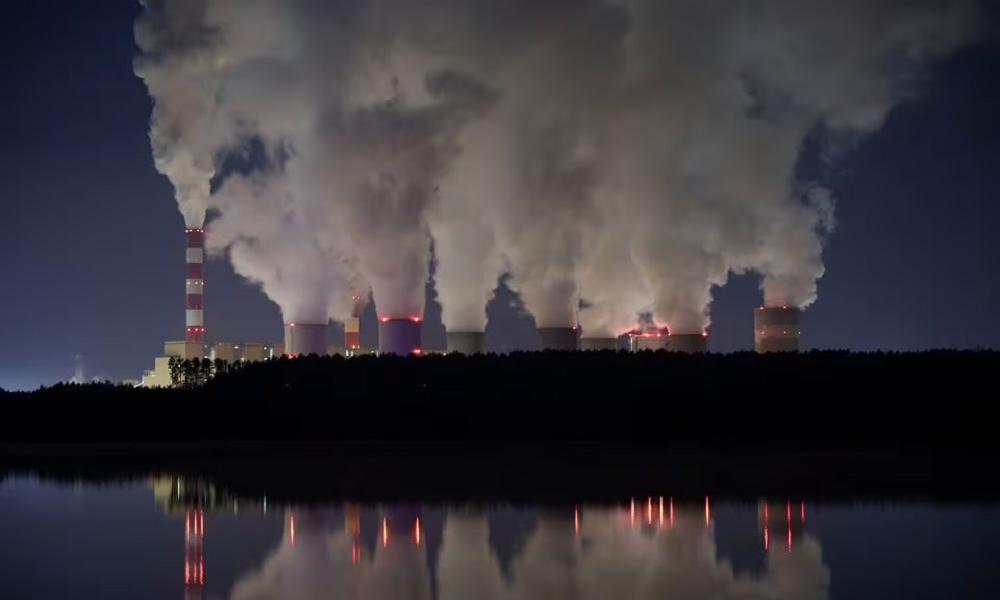Climate Change
COP28: What key issues will be discussed at UN climate change conference?

Following a year of record heat and drought, this year’s U.N. climate summit will feature a contentious set of issues for countries working to find common ground in tackling climate change, including whether to phase out fossil fuels and how to finance the energy transition in developing countries.
Here are the key issues in the two-week COP28 negotiations starting Nov. 30 in Dubai, according to Reuters.
TAKING STOCK OF CLIMATE PROGRESS
The main task at COP28 is a first-time assessment of countries’ progress towards meeting the 2015 Paris Agreement’s goal of limiting the global temperature rise to “well below” 2 degrees Celsius, while aiming for 1.5C.
With global efforts lagging, countries will try during this “global stocktake” to agree on a plan to get the world on track to meet climate goals, which could include urgent steps towards cutting CO2 emissions or boosting green technology investments.
As the COP28 talks begin, countries are at odds over whether this exercise should put the onus on all countries or just the world’s wealthiest countries to do more because they released the most planet-warming emissions historically.
Countries are expected to update their national emissions-cutting targets and plans by 2025.
FUTURE OF FOSSIL FUELS
The toughest talks at COP28 may focus on the future role of fossil fuels, and whether countries should commit to start phasing out the use of CO2-emitting coal, oil and gas.
Countries agreed at COP26 to phase down the use of coal, but they have never agreed to quit all fossil fuels – the main source of planet-warming emissions.
The United States, European Union and many climate-vulnerable countries are insisting on a final COP28 deal that commits countries to phase out fossil fuels. But the Group of 20 failed to agree on this point at their summit in July, and countries including Russia have said they would oppose a fossil fuel phase-out.
While the UAE’s incoming COP28 President Sultan al-Jaber has said the phase down of fossil fuels is “inevitable”, countries are waiting to see if the UAE will push other oil-rich nations to back the idea at COP28. Jaber has faced criticism for his dual role as head of the UAE’s state-owned oil and gas company ADNOC, and incoming president of the climate talks.
TECHNOLOGIES TO TACKLE EMISSIONS
The UAE and other countries whose economies are dependent on fossil fuels want COP28 to include a focus on nascent technologies designed to capture and store CO2 emissions underground.
While the International Energy Agency says these emissions-abatement technologies are crucial for meeting global climate goals, they are also expensive and not currently used on a large scale. The EU and others worry they will be used to justify continued fossil fuel use.
BOOSTING CLEAN ENERGY CAPACITY
Countries will consider setting goals to triple renewable energy capacity and to double energy savings by 2030 – a proposal made by the European Union, United States and the UAE’s COP28 presidency.
This looks set to win broad support, with G20 major economies including China already backing the renewables goal. But the EU and some climate-vulnerable countries insist on pairing this pledge to boost renewables with phasing out fossil fuels, setting up a clash.
FINANCING FOR THE COSTS OF CLIMATE CHANGE
Tackling climate change and its consequences will take an astonishing amount of investment – far more than the world has budgeted so far.
Developing countries will need at least $200 billion every year by 2030 to adapt to worsening climate impacts like coastal sea rise or storms, according to the U.N.. Additionally, they will need funding to help replace polluting energy with clean sources.
There are also the costs of the damage already being caused by climate disasters. At COP28, countries will be tasked with setting up a “loss and damage” fund to help with this, which developing nations say should unlock at least $100 billion by 2030.
These enormous price tags make the U.N. climate talks tense.
Vulnerable nations want more money spent on adapting to a world that is sure to become warmer over the next few decades. They want wealthy nations, whose past CO2 emissions largely caused climate change, to pay up.
The EU and U.S. have said they will put money in the climate damage fund at COP28, but they also talk about the need for private finance to help. Wealthy countries also face pressure to prove they have met an overdue climate funding pledge to provide $100 billion per year to developing countries.
‘SIDE DEALS’
Outside of the official U.N. negotiations, governments and companies will be making their own announcements.
The United Arab Emirates plans to launch a voluntary pledge from oil and gas companies to cut emissions, in a bid to bring the fossil fuel industry into the climate fight.
Other initiatives set to be announced on the sidelines of COP28 include pledges to curb emissions of the greenhouse gas methane, limit emissions from air conditioning and restrict private finance for coal plants.
Climate Change
Rescuers race to reach those trapped by floods in China’s Guangdong

WATCH: Rescuers on boats in China’s flood-ravaged Guangdong province raced to evacuate trapped residents, carrying some elderly people by piggyback from their homes and deploying helicopters to save villagers caught in rural landslides.
The southern Chinese province has been battered by unusually heavy, sustained and widespread rainfall since Thursday, with powerful storms ushering in an earlier-than-normal start to the region’s annual flooding season, Reuters reported.
Eleven people were missing in Guangdong by Monday morning, the state-owned Xinhua News Agency reported without giving further details.
Across the province, 53,741 people have been relocated, with 12,256 people being urgently resettled, Xinhua reported, citing the provincial government.
The cities of Shaoguan, Qingyuan, Zhaoqing and Jiangmen to the west and north of the provincial capital Guangzhou have been particularly hard hit.
In Qingyuan, houses and shops along the Bei River were submerged as the Pearl River tributary swelled, local media reported.
Aerial footage showed flood waters overwhelming a nearby town, leaving only roofs and treetops untouched.
Rescuers in Qingyuan tackled muddy waters, neck-high in some areas, to extract residents, including an elderly lady trapped in waist-deep water in an apartment building, videos on social media showed.
Other social media videos showed water gushing through roads and vehicles in disarray.
In Shaoguan, landslides trapped villagers who had to be rescued by helicopter while other rescuers traveled on foot to reach cut-off disaster sites, Reuters reported.
The Chinese military also stepped in to help clear roads.
The rains eased early on Monday, but some schools in the province were suspended.
Powerful thunderstorms are expected to return later in the week after a brief respite, marking an unusually early wet spell that is more typical in the months of May and June.
Climate Change
Massive river flooding expected in China, threatening millions

Major rivers, waterways and reservoirs in China’s Guangdong province are threatening to unleash dangerous floods, forcing the government on Sunday to enact emergency response plans to protect more than 127 million people.
Calling the situation “grim”, local weather officials said sections of rivers and tributaries at the Xijiang and Beijiang river basins are hitting water levels in a rare spike that only has a one-in-50 chance of happening in any given year, state broadcaster CCTV news said on Sunday.
China’s water resource ministry issued an emergency advisory, CCTV reported.
Guangdong officials urged departments in all localities and municipalities to begin emergency planning to avert natural disasters and promptly disperse disaster relief funds and materials to ensure affected people have food, clothing, water and a place to live, Reuters reported.
The province, a major exporter and one of China’s main commercial and trading centers, has seen torrid downpours for several days and strong winds due to severe convective weather, which has also affected other parts of China.
A 12-hour stretch of heavy rain, starting from 8 p.m. (1200 GMT) Saturday, battered the central and northern parts of the province in the cities of Zhaoqing, Shaoguan, Qingyuan and Jiangmen.
Almost 20,000 people have been evacuated in Qingyuan, according to state media, and some power facilities in Zhaoqing were damaged, cutting power to some places, Reuters reported.
Climate Change
UN sounds ‘Red Alert’ as world smashes heat records in 2023

Every major global climate record was broken last year and 2024 could be worse, the World Meteorological Organization (WMO) said on Tuesday, with its chief voicing particular concern about ocean heat and shrinking sea ice, Reuters reported.
The U.N. weather agency said in its annual State of the Global Climate report that average temperatures hit the highest level in 174 years of record-keeping by a clear margin, reaching 1.45 degrees Celsius above pre-industrial levels.
Ocean temperatures also reached the warmest in 65 years of data with over 90% of the seas having experienced heatwave conditions during the year, the WMO said, harming food systems.
“The WMO community is sounding the Red Alert to the world,” said WMO Secretary-General Celeste Saulo, who took over the job in January.
“What we witnessed in 2023, especially with the unprecedented ocean warmth, glacier retreat and Antarctic sea ice loss, is cause for particular concern.”
She later told reporters that ocean heat was particularly concerning because it was “almost irreversible”, possibly taking millennia to reverse.
“The trend is really very worrying and that is because of the characteristics of water that keep heat content for longer than the atmosphere,” she said.
Climate change, driven by the burning of fossil fuels, coupled with the emergence of the natural El Nino climate pattern, pushed the world into record territory in 2023, read the report.
WMO’s head of climate monitoring, Omar Baddour, told reporters there was a “high probability” that 2024 would set new heat records, saying that the year after an El Nino was typically warmer still.
Tuesday’s report showed a big plunge in Antarctic sea ice, with the peak level measured at 1 million km2 below the previous record – an area roughly equivalent to the size of Egypt.
That trend, combined with ocean warming which causes water to expand, has contributed to a more than doubling of the rate of sea-level rise over the past decade compared with the 1993-2002 period, it said.
Ocean heat was concentrated in the North Atlantic with temperatures an average 3 degrees Celsius above average in late 2023, the report said. Warmer ocean temperatures affect delicate marine ecosystems and many fish species have fled north from this area seeking cooler temperatures, Reuters reported.
Saulo, a meteorologist from Argentina who has promised to strengthen global warning systems for climate disasters, said she hoped the report would raise awareness of the “vital need to scale up the urgency and ambition of climate action”.
“That’s why we spoke about the Red Alert because we must care for the people and how they will suffer from these more frequent, more extreme events,” she told reporters. “If we do nothing, things will become worse and that will be our responsibility.”
-

 Latest News5 days ago
Latest News5 days agoRashid Khan named AWCC’s brand ambassador
-

 World5 days ago
World5 days agoMalaysian navy helicopters collide in mid-air, 10 killed
-

 Sport5 days ago
Sport5 days agoJaiswal ton powers Rajasthan to big IPL win
-

 World4 days ago
World4 days agoNorth Korea officials visit Iran in a rare public trip
-

 Latest News5 days ago
Latest News5 days agoAt least 1,500 families affected by recent floods: IRW
-

 Sport5 days ago
Sport5 days agoMawj Sahil player scores stunning halfway line goal in 1-0 win over Jawanan Wahedi
-

 Sport4 days ago
Sport4 days ago‘Serious talent’ Fraser-McGurk bonds with Warner to light up IPL
-

 Latest News5 days ago
Latest News5 days agoUS report cites ‘significant deterioration’ in Afghan women’s rights last year






















